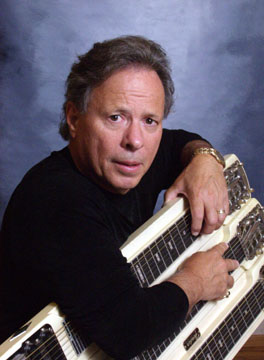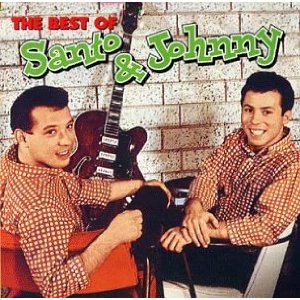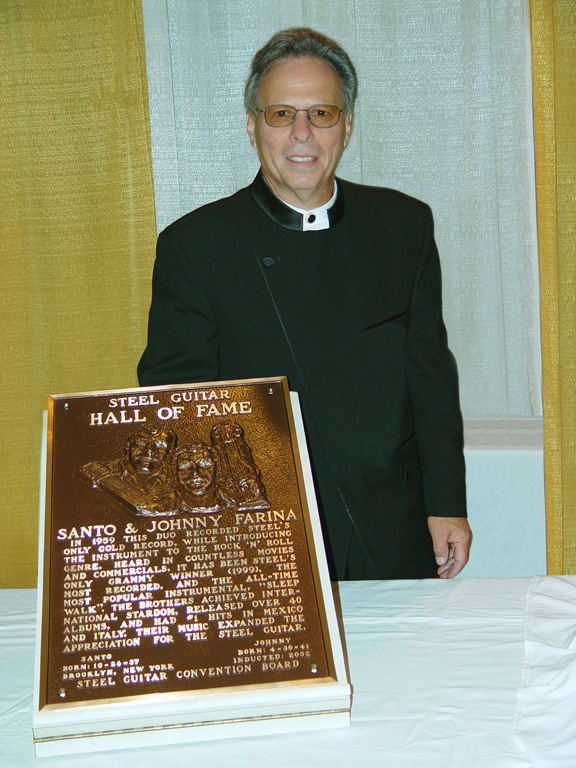By: Rick Landers
Johnny Farina Interview: PART TWO
 Some music diminishes over time and fades away as new sounds and trends emerge that capture new generations with faddish sound effects, speed or unheard of complexity. But, when I hear the 1959 Santo and Johnny Farina #1 hit instrumental, “Sleep Walk”, it always stops me in my tracks. The dreamy tune evokes feelings of sweet romance that are rooted deep within all of us.
Some music diminishes over time and fades away as new sounds and trends emerge that capture new generations with faddish sound effects, speed or unheard of complexity. But, when I hear the 1959 Santo and Johnny Farina #1 hit instrumental, “Sleep Walk”, it always stops me in my tracks. The dreamy tune evokes feelings of sweet romance that are rooted deep within all of us.
When “Sleep Walk” was released it was a strange brew of steel guitar and six-string, not because the two instruments were never entwined before. Country and Western stars and musicians of the South Pacific held their ground with the same instrument combination.
“Sleep Walk” migrated the sound to the pop and early rock genre of the day, and in its own way, introduced the sound to a budding audience of young listeners and guitar players. It had a magnetic appeal during a time when there began a tectonic shift from the sax to the guitar as the solo instrument of choice for a new generation of musicians.
What Santo and Johnny birthed was a song overflowing with the kind of magic and dreamy romance felt when two star crossed lovers gaze into one another’s eyes…when two hearts beat as one. It’s a small musical miracle that emotionally resonates to this day.
Santo and Johnny Farina are brothers. And, as Santo and Johnny, their names will forever be linked to the gold record that has been heard on classic rock stations, in scores of movies and by concert goers who’ve heard the song played by musicians like Jeff Beck, Carlos Santana, Les Paul, Chet Atkins, Joe Satriani, Brian Setzer, Larry Carlton, Steve Howe, Jean-Pierre Danel, The Ventures, Paul Muriat, Hank Marvin (The Shadows), Danny Gatton, Leo Kottke and more.
Johnny Farina and his brother would build long lasting music careers that would endure for decades. And although the success of “Sleep Walk” may overshadow their many accomplishments over the years, the song has served as a formidable calling card in an industry that demands talent, tenacity and resilience. The brothers weren’t satisfied to rest on their laurels and would release duet and solo albums to keep the flame alive.
The Farina brothers would garner a #1 hit and gold record in Italy for their recording of “The Godfather” theme, a #1 hit in Mexico with an instrumental of The Beatles now classic, “And I Love Her”, as well as be honored to see Brian Setzer gather up a Grammy Award for his version of “Sleep Walk”.
Santo and Johnny are inductees into the Italy Music Hall of Fame and the Steel Guitar Hall of Fame.
I spoke with Johnny about “the song”, The Beatles, Carlos Santana, and other things musical, just before he was headed out to the U.K. for a gig. He’s also moving a new album for the holidays, Christmas Mine. At the beginning of our conversation, I asked if he’d ever met Les Paul, who had covered “Sleep Walk” and our conversation turned to the interview.
********
 Johnny Farina: The Iridium’s kind of small, and he had a small dressing room. I’m sitting with Les. This is the first time we start to talk and I actually met him. As I’m speaking to him, he gets a note. People kept sending little notes back to his dressing room. He looks at this note and shows it to me and it said, “Hi, Les. Do you remember me?”
Johnny Farina: The Iridium’s kind of small, and he had a small dressing room. I’m sitting with Les. This is the first time we start to talk and I actually met him. As I’m speaking to him, he gets a note. People kept sending little notes back to his dressing room. He looks at this note and shows it to me and it said, “Hi, Les. Do you remember me?”
There were a few other names on the note that were signed. “Remember in 1929 you were on the running board of a Model T Ford and you had a stop clock in your hand and you wanted to see who had the faster car?” He said, “You know, Johnny, I remember that day. Yeah, I do remember that.”
The guy was so amazing. He was a genius. When I went onstage to play with him, he made the announcement. Some of the people stood up. They were in their late 80s. He was like a crackerjack. And he was a nice man.
After I finished playing, he actually said, “Listen, are you gonna play here?” I said, “Yeah, sure.” He said, “Sometimes when I have people up onstage and I want them to go, I say ‘There’s a phone call for you.’” I said, “Les, when you want to get rid of me, just tell me ‘There’s a phone call for you.’” He said, “No, that phone’s not gonna ring for you. I’m not gonna even say that. You can stay as long as you want.” I said, “Wow, that’s so sweet.”
I did a few numbers with him. The next morning, I get a phone call. It was kind of early and I said, “Who’s this?” The guy said, “This is Les.” I said, “Les who?” He said, “What the hell’s the matter with you? You don’t remember me from last night?” [Both Laughing]
I thought it was so funny because I knew that he would go to bed at like three in the morning, people were telling me. He’d get up late. This was an early call. He said, “Well, listen. Turn on your computer and see what’s on the screen.” He sent me a picture of him and me hugging. I thought that was so sweet.
Rick Landers: Yeah, he was wonderful. When I spoke with him last, we started talking about death a little bit. I’m not sure why we started talking about it. During the conversation, he said, “When you’re ticket’s up, you’re ticket’s up.” I laughed at that, and he looked at me and said, “That’s not funny.” Then he just looked at me. I thought he’d taken offense, then he laughed. [Both laughing]. He was clever.
Johnny Farina: When I looked at Les…there are certain people that you look at and you just look at them like they’ll always be around. They’re like a monument, like the Colosseum. It’s still gonna stand. I would look at him and always thought of him as, I know he was getting up there in age, but he always played.
I think there’s such magic in music. It really keeps you young. I’ve never stopped playing. I’ve been playing since I was about nine. It is part of my life. If I don’t play every day, there is something not right about the day for me. I must play every day.
Rick: Must be in your DNA.
Johnny Farina: Absolutely. I know how to do other things. I can fish. I like to go boating, but the instrument, I always thought that was part of it. Not playing on it, but playing in it.
We were inducted into the Steel Guitar Hall of Fame about 10 years ago and I was down in St. Louis. I was totally taken by so many steel guitar players, one after another, would just come up and just play. What I noticed about them, they had a lot of speed. Their technique was so fast. I was talking to some of them and said, “You know, you guys play more notes in one song than I play all year.” [Laughing]
I was never a fast player. When I play, I like to hold off of those notes as long as possible.
Rick: Sometimes the silence between notes is as important as the notes.
Johnny Farina: Yes, I believe that very strongly. Playing the steel is like singing. They know when to take a breath. I was talking to a guy who did some story on me in California a couple of years ago. He said, “I must describe your playing as the way Frank Sinatra would sing. He would always hold the note and he would never sing like right on the beat. He’d wait. He had that feel about him. That’s the way you sing.” What a compliment that was.
Rick: Yeah, he had a great sense of timing. I think that characterized him. Let’s talk a little bit about your background. Obviously we’re gonna talk about “Sleep Walk” because it’s been such a pivotal record in your career and your life. A lot of guitarists I know figured out how to play “Wipeout” and some Ventures music, but there was always “Sleep Walk” back in 1964, ’65, when I first picked up the guitar. Were you surprised to have a number one hit with it and eventually get a gold record? Was that out of the blue? When did you know you had a hit?
Johnny Farina: Ironically, when I was a kid, I never forgot that my father bought us a guitar, a steel guitar. There was a dealer in New York on Broadway. I don’t know if you ever heard of him. His name was Eddie Bell.
His place was the Gibson place where you would go. The first guitar my father bought was a Gibson lap steel.
I never forgot the day that my brother and I were walking in front of our parents. At that time they had the Camel cigarette billboard. The guy would actually blow a smoke ring across Broadway. I saw that and I told my brother, “Some day we’re going to have our pictures up on a sign like that. We’re gonna be really famous.” My brother gave me a look like he always would, “Yeah, yeah.”
He was four years older than me. He had a “Who cares?” attitude. He didn’t believe me. At that time, for some reason, I always believed. I never thought about a number one record. I just knew that we were going to be famous. That was it.
Rick: I hadn’t realized until yesterday really that “Sleep Walk” actually had lyrics. I listened to vocalist Betty Anne Steele’s version of it, which I thought was really good.
Johnny Farina: Out of all the people who sang it, she captured it. When “Sleep Walk” was a hit, we were only kids. We signed to Trinity Music and part of the deal was that they would get the publishing. After many, many years, I got my publishing back.
In the beginning they had the publishing. Santo and I were on the road and when we came back to the office – a lot of times we would stop at the office instead of going home – we would see what was going on with our manager. His name was Ed Burton. He owned Trinity Music and became our manager. We stopped there on one of our trips and he said, “Oh, listen. I want you to hear something.”
They put the 45 on and it’s Betsy Brice singing “Sleep Walk”. We looked at him and didn’t understand it. We didn’t realize that they wanted to get more mileage out of the song. I think they were thinking that it’s a big instrumental. Why not cover it with a vocal and get really good mileage out of it?
But, it never really took off. Even though Catarina Valente, who was an international singer, she sang it. The Lettermen sang it on one of their early albums. Diana Ross actually sang it. “Sleep Walk”, I’m concerned that it was born instrumental and it will remain instrumental, unless something happens like…all of a sudden a movie deal comes in and I have to sign off on it, negotiate and so forth.
Recently there was a movie that might be coming out called The Conjuring. It’s sort of like a scary movie because that’s the trend today. They actually want to use the vocal version which I was really surprised at. I have no problem with that. I actually thought if they came out with a vocal version, who knows, maybe Lady Gaga might do it.
Rick: Sure. Hey, there you go.

Johnny Farina: Because “Sleep Walk” can actually be for any time…it was written in one of the newspapers when Celine Dion sang the song from Titanic, you visualize the ship going down. But with “Sleep Walk”, it could be La Bamba or Eddie and the Cruisers. It could be 12 Monkeys. It could be Neil Armstrong landing on the moon. It could be anything. It’s for any time.
Years ago, I actually did a version of “Sleep Walk” operatic style. I had a girl sing it and it was really good. I wanted to get it to, at the time, Pavarotti. Unfortunately, he passed away. I had an idea to do it operatic style. I changed the chord structure as I did in my Christmas CD. There’s a version of “Sleep Walk”.
I call it my Christmas feel. The whole chord structure is changed and everything.
Rick: When I was listening to “Sleep Walk” yesterday – I know that it’s been in several movie scores – it caught my attention that the song can be either very romantic and the same song can also be very haunting. It lends itself to a lot of different genre of movies, don’t you think?
Johnny Farina: Actually, I have a list of movies that you would not believe. It’s been in at least 30 movies.
As I’m speaking to you, I’m looking through my files. I have a group of movies that “Sleep Walk” was actually used in. But, it can be used for any time. I’ll just try to remember some of the movies that go from one end of the spectrum to the other, like Eddie and the Cruisers or from a ‘50s movie to a futuristic like 12 Monkeys.
Rick: Wasn’t it in a Stephen King movie?
 Johnny Farina: Yeah, it was called Sleepwalkers. It was in a movie called All I Want for Christmas, with Cher, A Smile Like Yours, The Locust, Mermaids. It’s been in so, so many movies.
Johnny Farina: Yeah, it was called Sleepwalkers. It was in a movie called All I Want for Christmas, with Cher, A Smile Like Yours, The Locust, Mermaids. It’s been in so, so many movies.
I think perhaps the most impact that it had for me was when it was used in La Bamba, when they had the funeral scene at the end. It was such a touching, moving thing. That’s one movie that I’ll never forget how it was used. When it was used in La Bamba, it was such an important part of that movie, just to see the funeral cars coming down and know that my song was used and connected to the three legends.
Rick: The song came out in ’59, right? That was the same year that Buddy Holly, The Big Bopper and Ritchie Valens passed away?
Johnny Farina: Yes.
Rick: Very appropriate too. To move off into a slightly different direction, would you say the song is easy to play but it’s not necessarily easy to play well?
Johnny Farina: I think it’s easy to play. You’re right, the first part. It’s easy to play. The second part, to play well, it has a feel to it. I hear a lot of steel guys playing it and they just play it. It’s like play it or PLAY it. Do you know what I’m saying?
Rick: Play it and feel it.
Johnny Farina: Yes, you have to feel it. It’s like so many people when I hear them singing a song, either they have it or they don’t have it. I hear a lot of musicians that play it. They play it note for note. I’m not saying that the notes are wrong. The feel, they don’t have it.
I haven’t been touched by anybody. But, there are people that did different versions, like Larry Carlton. He did his feel to it and he captured a different painting, the way he did it. Or Brian Setzer the way he did it. They didn’t try to copy the original. They did their own thing on it. That was good.
Rick: In trying to cover a classic, it’s really difficult to get the feel of the original, I think, in many cases.
 Johnny Farina: It’s like anything else. When people ask me a question, “How did you feel when that song was created?” or “What made you guys write that song?” The best way I feel I can describe it is, if I were to be painting a portrait. I’d get the brush and just dip it in the paint. There would be a certain amount of pressure that I’d be using to get the paint onto the brush. When I make that stroke, I wouldn’t think about it, I would just do it. That’s the feeling I have with “Sleep Walk”.
Johnny Farina: It’s like anything else. When people ask me a question, “How did you feel when that song was created?” or “What made you guys write that song?” The best way I feel I can describe it is, if I were to be painting a portrait. I’d get the brush and just dip it in the paint. There would be a certain amount of pressure that I’d be using to get the paint onto the brush. When I make that stroke, I wouldn’t think about it, I would just do it. That’s the feeling I have with “Sleep Walk”.
It was a painting and when the painting’s painted, it’s painted. It’s finished. That’s what I got from that, when people ask how I wrote the song. It was a natural thing.
My brother and I had no idea we were writing songs. It was just a natural thing that happened to us. We used to do cover songs and after awhile of playing cover songs, we would jump into jamming a little. We’d fool around with melodies.
It was only my father’s insight. He had a good ear. He kept saying, “You guys are writing songs.” He bought us a Webcor tape recorder and said, “I want you to tape everything you think you like to play,” and he was right. He had good ears.
Rick: Yeah, he was a clever guy.
Johnny Farina: He was. Here’s a man who came from Italy when he was nine. He had no musical knowledge of any sort. He was drafted into the army. During that time he was stationed in Texas and Oklahoma. He heard this beautiful-sounding instrument and that’s what turned him on to the steel guitar. He wanted us to play it. That’s basically how we got introduced to a guitar. We lived in an Italian neighborhood. All we kept hearing was mandolins, accordions and acoustic guitar. We never heard a steel guitar.
Rick: Have you ever heard of Bud Isaacs?
Johnny Farina: I don’t think so. Have you ever heard of Alvino Rey?
Rick: No, I haven’t. I’ll check him out.
Johnny Farina: He used to have a program with the King Sisters or something on TV years ago. Alvino Rey, and my father was also inspired by the background players of Hank Williams. He used to listen to country and western. He loved country and western. Ironically, we never really play country and western.
CONTINUED AT PART TWO HERE.
SLEEPWALK BY GUITAR MASTERS
LARRY CARLTON/JOHNNY FARINA (September 2012)

HANK MARVIN

BRIAN SETZER

Robert Fernandez (11 years ago)
Rick, could you help me directing me on hot to go about obtaining permission to use sleepwalk (Santo and Johnny) for a TV ad?
I am launchina webiste and I will do some teasers at my local station…
Robert.
Port Isabel Texas.
Guitar International Magazine (11 years ago)
Robert – You can e-mail Johnny at: zzzwalk@optonline.net Best Regards, Rick
Robert Fernandez (11 years ago)
Thank you so very much.
Great interview/er.
Robert.
Jonathan T. (10 years ago)
I love reading about the inspiration of instrumental songs. I really enjoyed this interview. Great job dude.